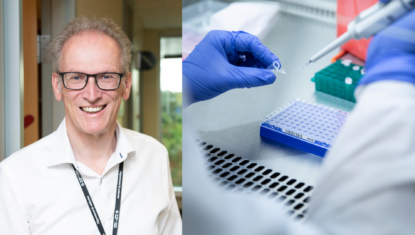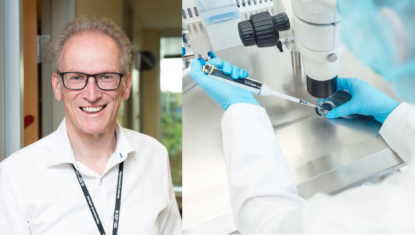Hanns is a neurologist and clinical academic specializing in genetic neuromuscular disorders and rare disease. He holds appointments as Senior Scientist at the CHEO Research Institute and Professor of Neurology at the University of Ottawa Brain and Mind Research Institute and Department of Cellular and Molecular Medicine, and is a practising neurologist at The Ottawa Hospital and Ottawa Centre for Neuromuscular Disease. He holds a Canada Research Chair in Neuromuscular Genomics and Health and a CIHR Foundation Grant for his research program on precision health in neuromuscular disease.
Hanns trained as a neurologist in Munich, Germany and in Montreal, Canada. He leads a research group at CHEO RI where his research interests include molecular therapies of neuromuscular disorders, molecular pathogenesis of muscle and neuromuscular junction disorders, neurogenetics and translational research, and genomic approaches for diagnostics and gene discovery in neuromuscular and rare diseases. In addition to his scientific and clinical research interests, he is internationally active in rare disease science policy and research collaborations.
Hanns’s clinical activities focus on clinical research and care of patients with rare neuromuscular disorders, including congenital myasthenic syndromes (CMS), myotonic dystrophy (DM1), spinal muscular atrophy (SMA), and muscular dystrophy. He has a strong commitment to national and international networking and working with patients and patient organizations, and currently leads the Neuromuscular Disease Network for Canada (NMD4C), a new national networking initiative to improve outcomes in neuromuscular disease across Canada, funded by CIHR and Muscular Dystrophy Canada.
For more details about the lab can be found by clicking this link.
Related News
-

06/11/2024
New Genetic Discoveries Linked to Neurodevelopmental Diseases
-

22/05/2024
CHEO Clinical Trial Offers Hope for Myotonic Dystrophy Patients
-

20/04/2023
CHEO Research Institute sole Canadian site to receive funding as part of European consortium to accelerate drug therapies for neuromuscular disease patients
Research Projects
-
Salbutamol modifies the neuromuscular junction in a mouse model of ColQ myasthenic syndrome
04/07/2019
Motor neurons contact their target muscle fibres at highly specialised chemical synapses, neuromuscular junctions (NMJ).
-
A phase 3 randomized study evaluating sialic acid extended-release for GNE myopathy
25/01/2019
This study provides Class I evidence that for patients with GNE myopathy, Ace-ER does not improve muscle strength compared to placebo.
-
Targeted therapies for congenital myasthenic syndromes: systematic review and steps towards a treatabolome
We assess the strength and quality of the evidence and create a dataset that provides the foundation for a computer-aided system to enable clinicians to gain easier access to information about treatable variants and the evidence they need to consider.

